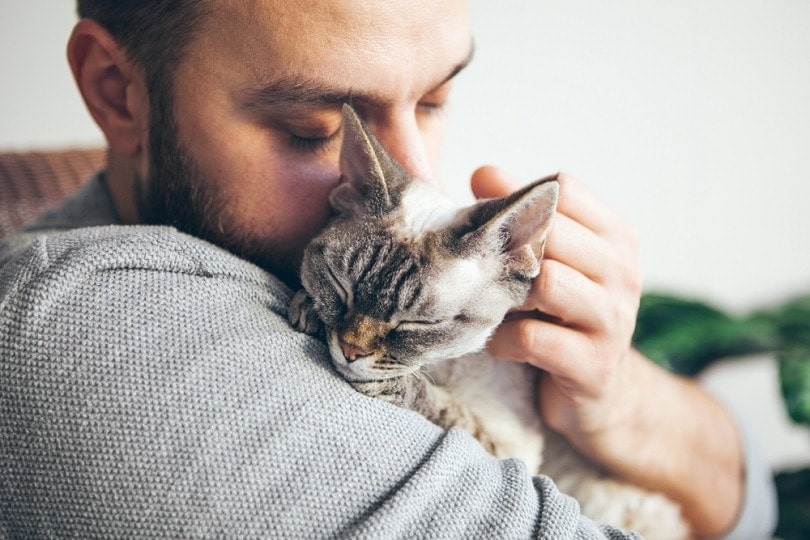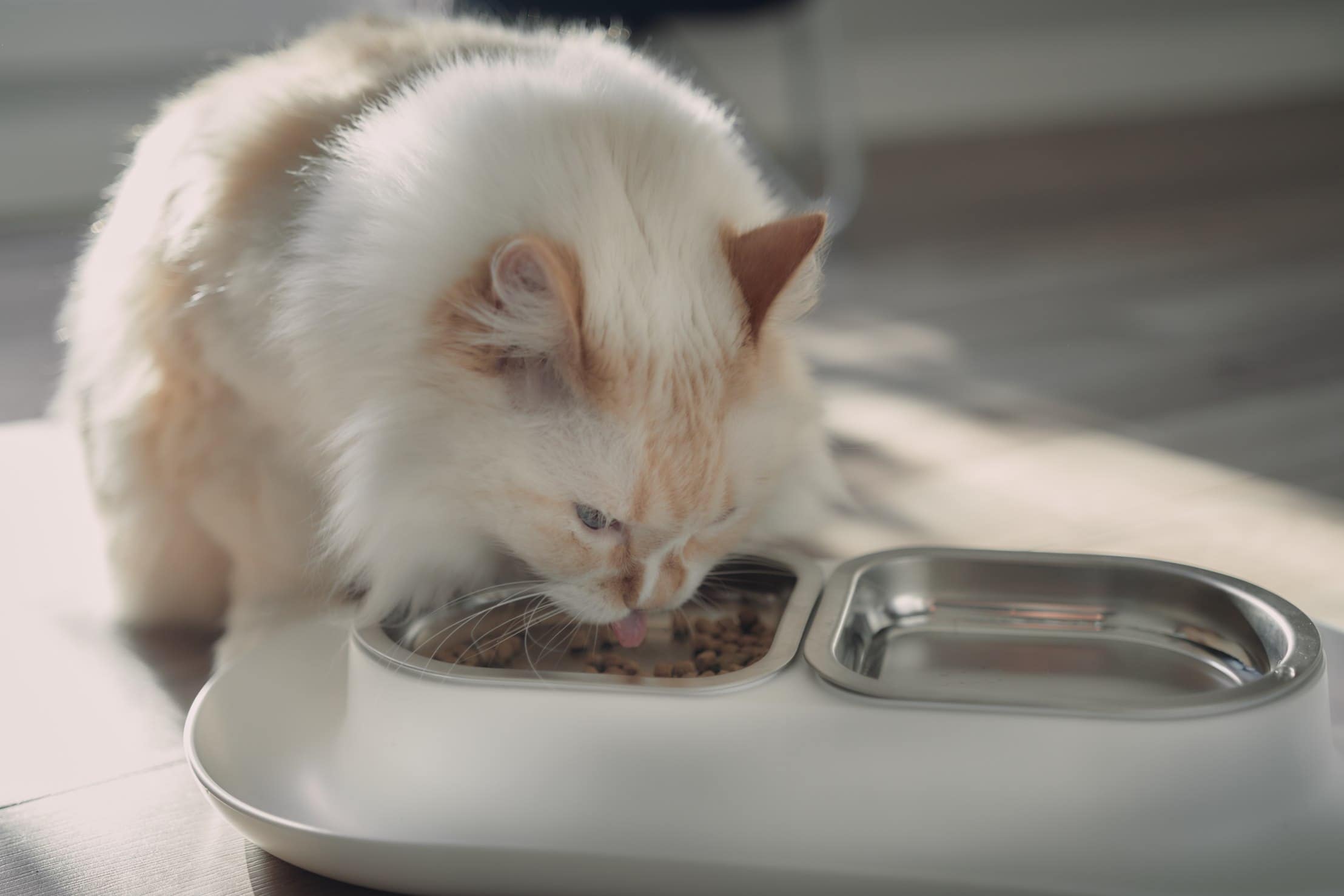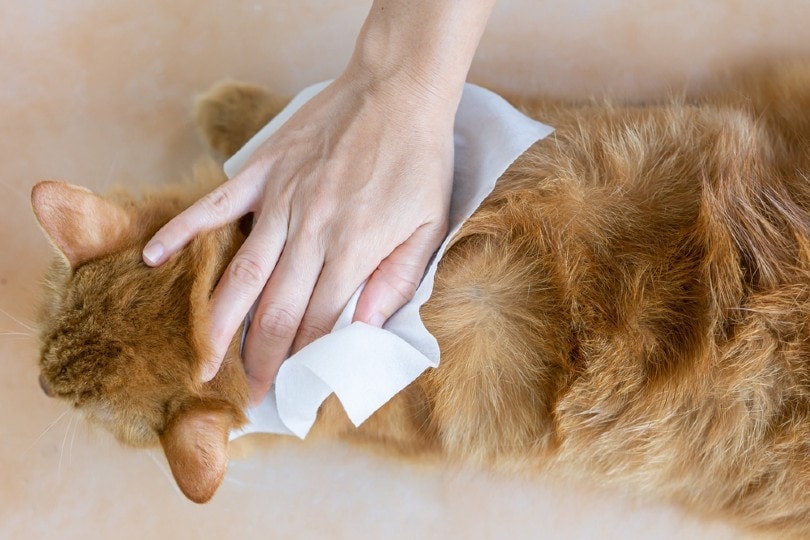Why Do Cats Lick Windows & Screens? 8 Likely Reasons

Updated on
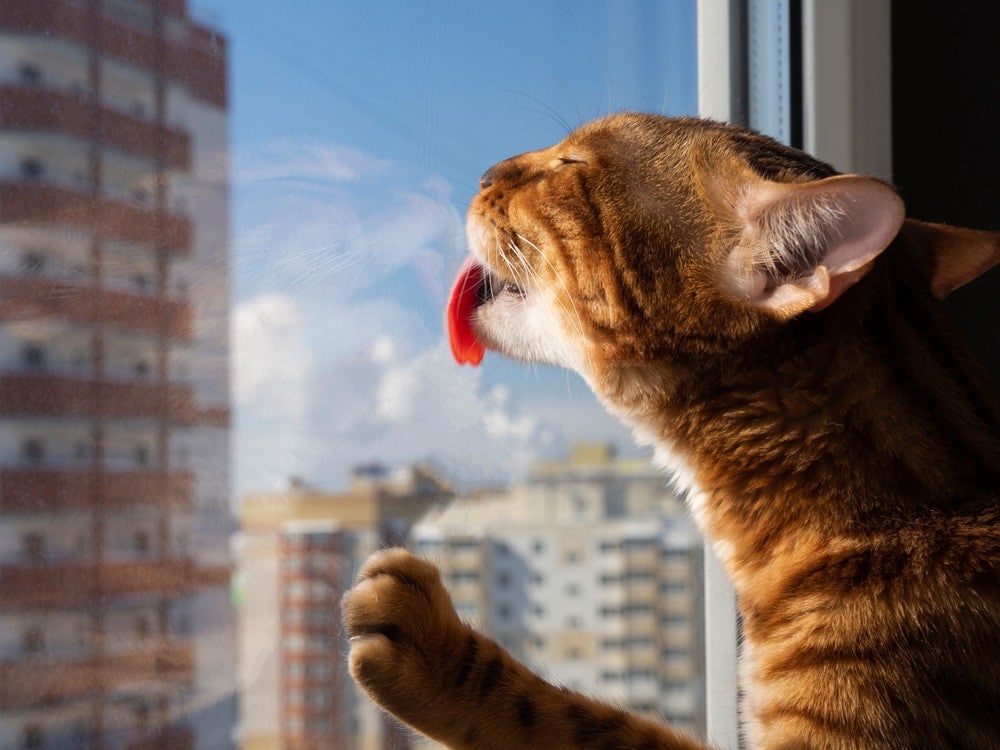
Click to Skip Ahead
Cats have all kinds of strange quirks and odd habits. They do things that we find both adorable and plain bewildering, like licking windows and window screens. While it’s not one of the weirdest habits that they can develop, it can still make us wonder what a cat’s fascination with windows is all about.
There are a few reasons that our cats are obsessed with licking windows. More often than not, the reasoning is harmless and isn’t a cause for concern.
The 8 Reasons Cats Lick Windows
We might only consider windows to be interesting for the view that they offer, but cats see the world differently. Still, licking the glass can seem like an odd thing to do, even for our adorably strange felines. Here are a few reasons that your kitty is licking your window.
1. Attention Seeking
Sometimes, our cats develop strange habits simply because they want your attention. They might just be curious the first time that they do something, but the reaction that they get from you entices them to repeat it.
By saying or doing something to your cat when they do something strange, like licking the window, you’re inadvertently reinforcing the behavior. If it’s a habit that you don’t want your cat to continue, try to refrain from showing them the attention that they’re after. Instead, wait until they’re focused on something else — their favorite toy, for example — and then give them all the ear scratches that they desire.
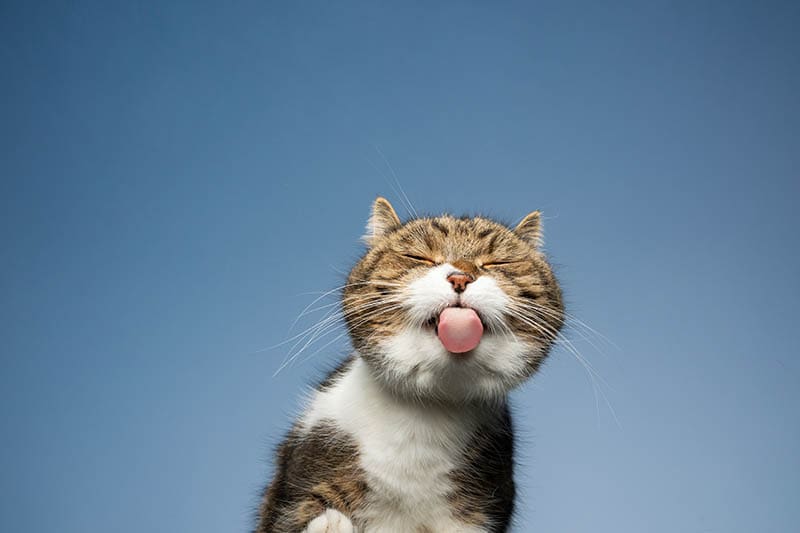
2. Condensation
On occasion, cats can be incredibly lazy. The same goes for when they’re napping on their favorite windowsill. If they’re thirsty and too comfortable to move, the condensation on the window that they’re sitting next to is an easy way to quench their thirst.
There are also their instincts to take into account. In the wild, standing water is dangerous. It can carry all sorts of things that can make felines sick, including parasites. While your domesticated cat probably doesn’t have to worry about their water bowl being contaminated, being drawn to running water is instinctual. The condensation dripping on your window is a prime target.
3. Curiosity
Cats don’t explore things the same way that we do. As humans, we grab hold of something and examine it with the help of our hands and eyes. Cats learn about new things through taste and smell. They’re also a bit like small children in that they don’t know the dangers of putting unknown substances in their mouths.
The reason that your cat is licking the window could be as simple as them investigating the new cleaning product that you’ve used on the glass. This is why it’s always a good idea to use pet-friendly cleaning products around your home.

4. Outdoor Interaction
Many cats are housebound, and as a result, their only interaction with the outside world is through a window. While they’ll contentedly sit and watch the world go by around them, there are times when something that they see makes them want to get closer.
If you’ve spent any amount of time around your cat when they’re surveying the outdoors, you’ve probably heard their chattering as they “talk” to the birds hopping around your lawn. Licking the glass is the same thing. It’s your cat’s way of expressing their interest in whatever they’ve seen outside.
5. Plastic Windows
Most windows are made of glass but plastic isn’t hard to come by. Some types of plastic contain beef tallow, which is rendered animal fat. Plastic bags can use this kind of plastic too. Since cats are omnivores, you can probably guess why many of them love to investigate these types of plastic.
This goes for your windows too. While our senses cannot determine if beef tallow was ever used in the production of our plastic windows, our cats’ noses are far more refined.
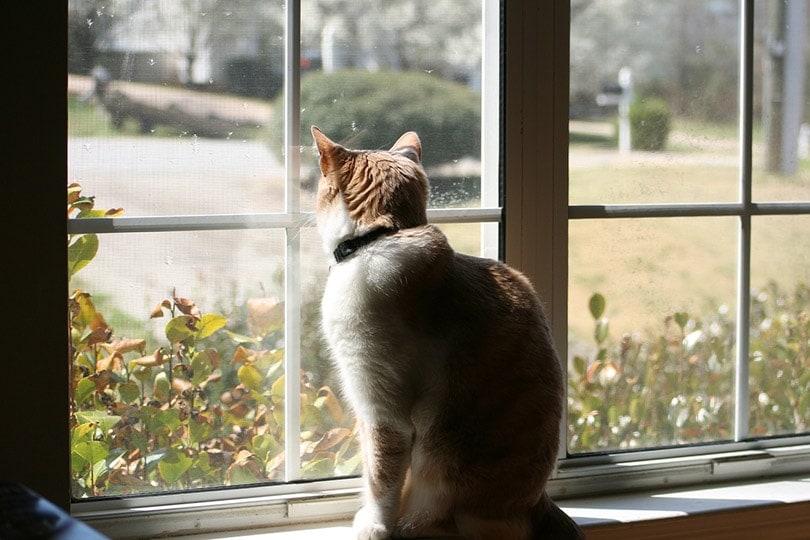
6. Salt
This reason is only applicable if you live along the coast or by another saltwater source and varies depending on the weather. Muggy, damp days can lead to saltwater clinging to your windows. There’s never that much of it — just a fine layer on the glass.
Not all cats like the flavor, so you won’t find all of them partaking in the free salt lick. For the few that do enjoy the taste, however, the treat isn’t going to be ignored.
7. Temperature
On hot summer days, we all seek out ways to keep ourselves cool. Your cat will often find a delightfully cold, shady spot somewhere in the house. Seeking a way to cool down is also a reason that they might lick your window, particularly if it’s located in a cooler section of your home. If the glass is cold and your cat is too warm, they will use it to their advantage.
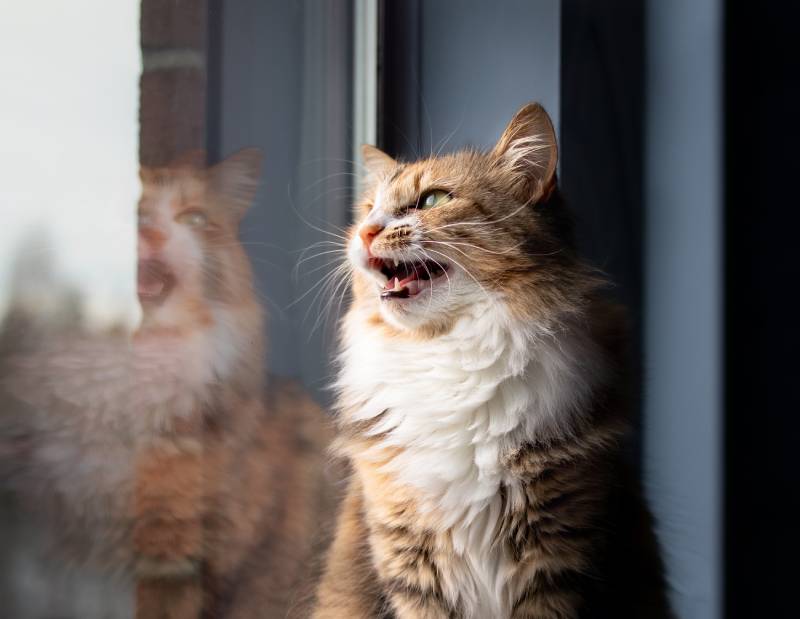
8. Texture
Your cat enjoying the texture of the window may seem to be an unusual reason for their window-licking habit, but remember that they have no other way of exploring things and they have preferences when it comes to textures too. This is more apparent if your cat licks windows even when there isn’t any condensation on the glass.
The 2 Reasons Cats Lick Window Screens
Pets seem to love window screens, especially cats, with their claws and habit of climbing everything, even objects that shouldn’t be climbed. While cats climbing window screens and ripping them to shreds is expected for many pet parents, licking them is another story.
Your cat may lick window screens for many of the same reasons as the windows themselves. But there are a few more things to take into consideration.
9. Bugs
Window screens enable us to open the windows and enjoy refreshing evening breezes without worrying about bugs. The insects that do fly into the screens usually get trapped as they try to squirm their way through. While it means we have to eventually clean up all the icky creepy crawlies, our cats find the trapped bugs far more enticing.
Cats, whether we like it or not, do eat bugs occasionally. Even if they don’t go out of their way to hunt them, felines will chase all manner of insects that catch their eye and devour them with relish. While the bugs trapped on the window screen are less interesting, they are still tasty treats for your feline. You may find their tendency to lick the screen is simply to take advantage of the free meal.

10. Anxiety
Stress affects cats in various ways. Some spend the day sulking, others pee where they shouldn’t, and still others develop strange habits. Licking the window screens or the windows themselves could be a method of self-calming. The danger of this is that what starts as a way to soothe oneself can become a compulsive habit, like excessive grooming.
You can help reduce this behavior by keeping your cat’s routine as stable as possible, especially if you recently moved to a new house or introduced a new pet to the home. Both cats and dogs like predictability, and new events can throw them off their game. By showing them that nothing has changed, you’ll be reassuring their worried nerves.
FAQ:
What Do I Do If My Cat Has Pica?
Pica is a medical term for eating inedible objects. It’s not just something that our pets do, as humans have been known to do it too. For cats, it presents itself as a strange craving to eat items that they shouldn’t, from plastic bags to your favorite wool coat or even your shower curtain.
- Compulsive behavior
- Genetics
- Medical problems
- Nutritional imbalance
- Stress
Your veterinarian will be able to tell you if medical reasons are why your cat wants to eat things that they shouldn’t. They’ll also be able to help you figure out how to discourage your cat from continuing the behavior. Patience is essential here. Helping your cat stop eating nonfood items will take time.
Alleviate Boredom
Sometimes, cats eat things that they shouldn’t — or lick windows — because they’re bored. By giving them attention more often and offering more mental challenges during playtime, you’ll distract them from the unwanted behavior and make them happier. It’s also a good way to bond with your cat. If they’re at home alone frequently, consider investing in cat toys to keep them entertained.
Cat Deterrent
Strong smells like citrus or tastes that your cat doesn’t enjoy can be great deterrents for inquisitive felines. These are not cure-alls, but they’re likely to put off your cat for a while until the smells go away. Be careful to find a pet-friendly deterrent to avoid poisoning your cat.
Cat-Friendly Chews
If your cat is determined to chew on things that they shouldn’t, offer items that are safer for them to gnaw on. Cat grass works well with cats that keep eating the houseplants. There are also toys or puzzles that you can buy that will keep your cat’s attention as they find a way to the treats inside.
Remove Items
While you work to correct this behavior, a simple workaround is to make the objects that your cat targets unavailable. For plants that are toxic to cats, removing them will keep your feline safe and be more reliable than relying on smells that your cat avoids. The same can be said for anything else that your cat chews on, like your coat. Make sure to hang it up in a closet that your cat can’t get into when you’re not using it.
Is Licking Windows and Window Screens Dangerous for My Cat?
As strange as it is, licking windows and window screens isn’t dangerous for your cat. It’s generally unwanted behavior but it’s relatively harmless.
There is an exception to this, however. Many window cleaning products are toxic to pets, and licking the window means your cat is ingesting the chemicals that you used to clean it. It’s why you should find pet-friendly cleaning supplies whenever you have a pet that can come into contact with the chemical, either directly or indirectly.
Final Thoughts
Your cat licking windows and window screens can be a strange sight to see. We don’t know for sure why our felines enjoy doing it so much, but it isn’t a dangerous habit unless you use toxic glass cleaners. Hopefully, these possible reasons that your cat is licking windows have helped you decide how to correct your kitty’s behavior.
Featured Image Credit: Azovsky, Shutterstock



